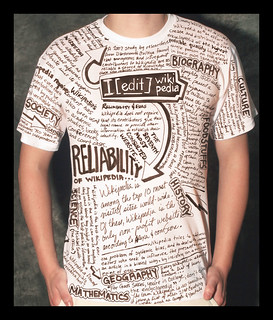
|
Advantages of using the Internet:
|
 |
|
Disadvantages of using the Internet: |
Image credit: Internet by transCam |
|
|
|
The main issue with the Internet, is that you have so much information within your reach, that it can be difficult to find the information you need. The solution is to go into your search with a clear idea of the what you need to find out about. In this case you have your chosen theory and the media you have chosen to apply it to, e.g. semiotics and Andy Warhol. If you're unsure of what the theory means, you can use Google as a dictionary, e.g. search for logistics definition. Click on More info >> for web definitions of logistics and see if these help you to understand the term. This can also be a great way to find new keywords to use within |
Image credit: Google Neon by mjmonty |
|
Remember: It's usually best to keep to keywords, rather than typing in your assignment question. Tips for searching:
|
|
|
While Google aims to search everything it can, Google Scholar focuses on the scholarly literature available on the Internet. This includes, articles, theses, books, abstracts, U.S. court opinions, and patents, found on the websites of academic publishers, professional societies, online repositories, universities and more. By scholarly literature, Google means publications that are based on the results of research or studies. However, as the the checks on the "scholarly" work, is done automatically (not a real person), you still need to be careful and double-check that what you find is in fact scholarly. Try it! Try searching for logistics event management in Google, then |
 |
|
| try the same search in Google Scholar. | Image credit: Google Scholar P.S. I'm a grad student :) by clemsonunivlibrary | |
Which version of Google should I use? Knowing which version of Google to use depends on what information you need to find. For most people starting out with a research question, Google is a good place to start to get an idea of what's been published on your topic. As you get a clearer idea of the topic, you may see a gap in the information that needs support from the research, so you may want to switch over to Google Scholar to focus your search on the more scholarly literature. Setting up Google Scholar In order to access the material subscribed to by Wintec, you'll need to set-up your Google Scholar settings. See the Google Scholar guide to see how to do this. |
||
|
Wikipedia often appears at the top of your search results. This is because of the way Google ranks its search results - it looks for pages which have a lot of links going to and from it (amongst other things). So in some respects, it's a bit of a popularity contest. Wikipedia is edited by a group of volunteers, this can mean that anyone could be an editor (read about Shane Fitzgerald's experiment - The readers' editor on ... web hoaxes and the pitfalls of quick journalism). So someone who is a world expert could write the entry, or someone in your class with a strong personal opinion. Wikipedia can be a great starting point for your research, but should never be used in your reference list. Instead look for the references and external links to take your research further. |
 |
| Image credit: Wikipedia - T-shirt by mikeedesign |
Anyone can publish on the Internet, this means that you have to evaluate the information you find and where it comes from.
Not sure why? Check out these sites, and determine which ones are fake - POP! The First Human Male Pregnancy, Feline reactions to bearded men, Havidol, and Meet Yoda the cat with FOUR ears.
The way around being duped by a fake site, or uncovering misleading information, is to check the information you find against other sources - we call this triangulation. It allows you to build up a picture about the subject and ensure that you're not getting incorrect information.